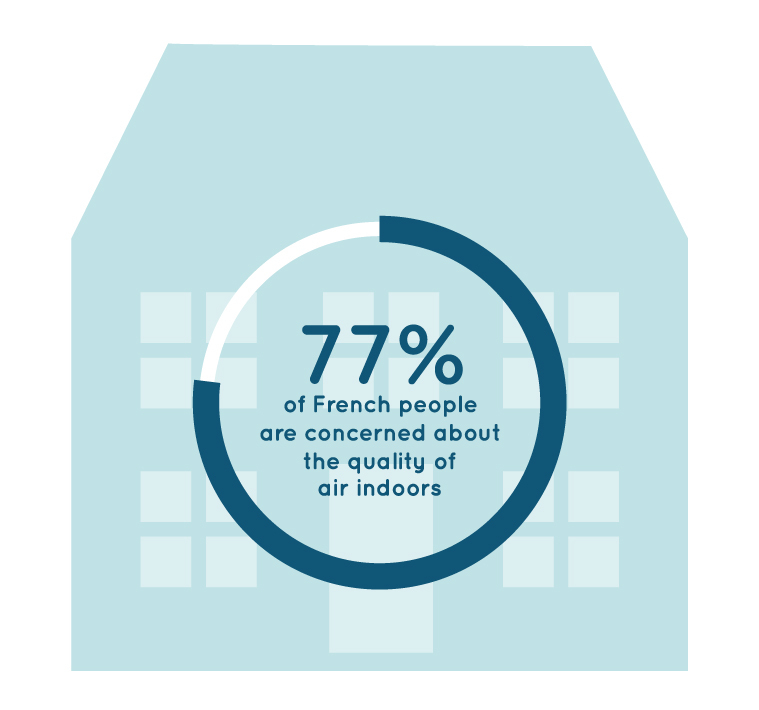77% of French people concerned about indoor air quality
OpinionWay Study for Evertree
The Indoor Air Quality Observatory (OQAI) in France estimates the social cost of the country’s indoor air pollution at €19 billion.
We often hear about outdoor pollution, particularly when it comes to climate change, but indoor air pollution is rarely discussed. This is despite the fact that the World Health Organization has found that the air we breathe indoors is 8% more polluted than the air we breathe outdoors.
Indoor air pollution is silent because it cannot be seen or smelled.
However, a new study confirms that with the pandemic, the lockdowns and the subsequent rise in working from home, indoor air quality has become a pressing issue for a majority of French people. The study “French People and Indoor Air Quality” was conducted in May using a sample of 1,062 individuals over the age of 18 representing the French population as a whole.
People in France want cleaner indoor air
This concern applies to collective, shared spaces such as mass transit, offices and schools, as well as their private homes.
The health and economic issues stemming from indoor air quality cannot be dismissed: the Indoor Air Quality Observatory (OQAI) in France puts the estimated social cost of the country’s indoor air pollution at €19 billion.

When purchasing furniture, 73% of French people prioritize health over environmental impact or a Made in France label
Indoor air pollution is caused by everyday items like flooring, textiles, paint, cleaning products and even furniture, all of which emit the notorious VOCs or volatile organic compounds. One of these, formaldehyde, is particularly toxic, having been recognized as a carcinogen by the WHO in 2004.
While quality, comfort and design are the top criteria (95%, 92% and 87% respectively) when selecting furniture, the study found that 73% of the people surveyed consider the toxicity of the components (paints, solvents, resins, etc.) to be an important factor when making a furniture purchase.
The need for reassurance that their health will not be negatively impacted outweighs both an item’s Made in France label (70%) and its environmental impact – carbon footprint, recyclability, FSC or PEFC labels, and so on (64%).
As a result, 65% of French people are willing to change their habits and pay more for a product free of toxic emissions, even in this period of declining purchasing power. This number rises to 76% when it comes to furniture for children’s bedrooms.
French people are challenging public action
Meanwhile, 87% of respondents state that they have little access to reliable information about this topic. For while outdoor pollution is well documented, indoor pollution is imperceptible, despite the fact that it affects the items we use every day.
Given this lack of clear information, French people are challenging public action, and 77% feel that their government is not doing enough to control the use of toxic chemicals in furniture manufacturing. And 58% of those surveyed feel that companies are not doing enough to offer products that preserve indoor air quality.

92% of French people are in favor of furniture labels that indicate toxicity levels
For Evertree, an innovative French start-up, this study strengthens our belief in the work that we have been engaged in since 2016 to improve indoor air quality by developing sustainable materials that are safer for people and the planet. Evertree has produced the first-ever high-performance plant-based resin for furniture applications that is not only made in France and formaldehyde- and isocyanate-free, but also boasts a low carbon footprint.
Currently, Evertree is working to unite key stakeholders in the wood and furniture industries to advocate for regulations of VOC emissions in furniture similar to those that were instituted for construction materials in 2012. Indeed, 92% of French people indicated that they would like to see labels on furniture indicating the levels of toxic emissions these items release into the air. The people have spoken, and while this battle may be difficult, it is one we must win.
This website has been designed to reduce impact on the environment.